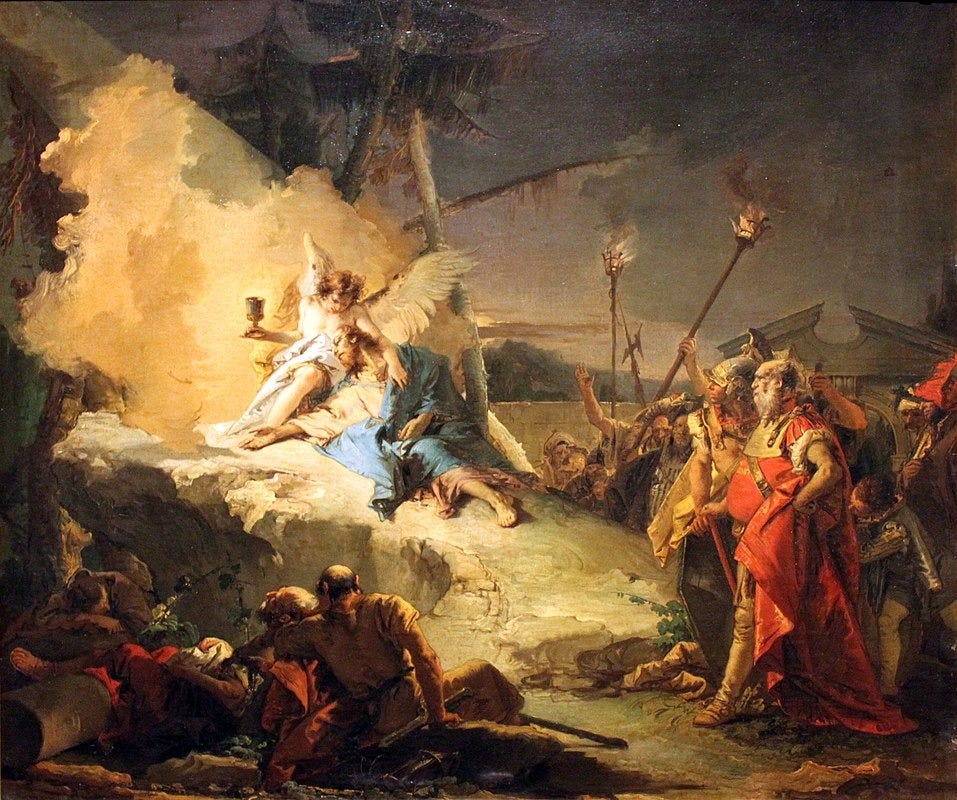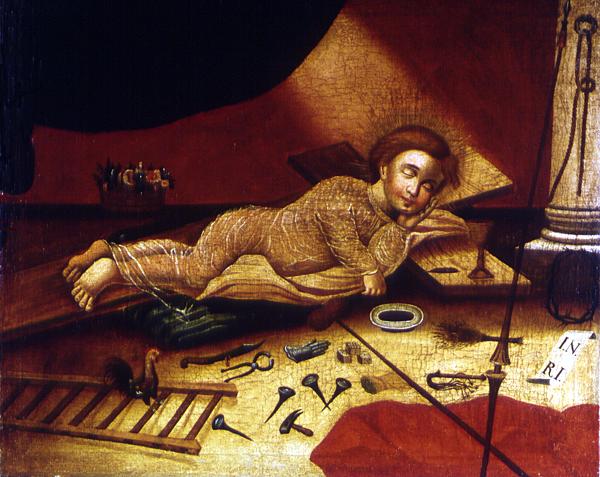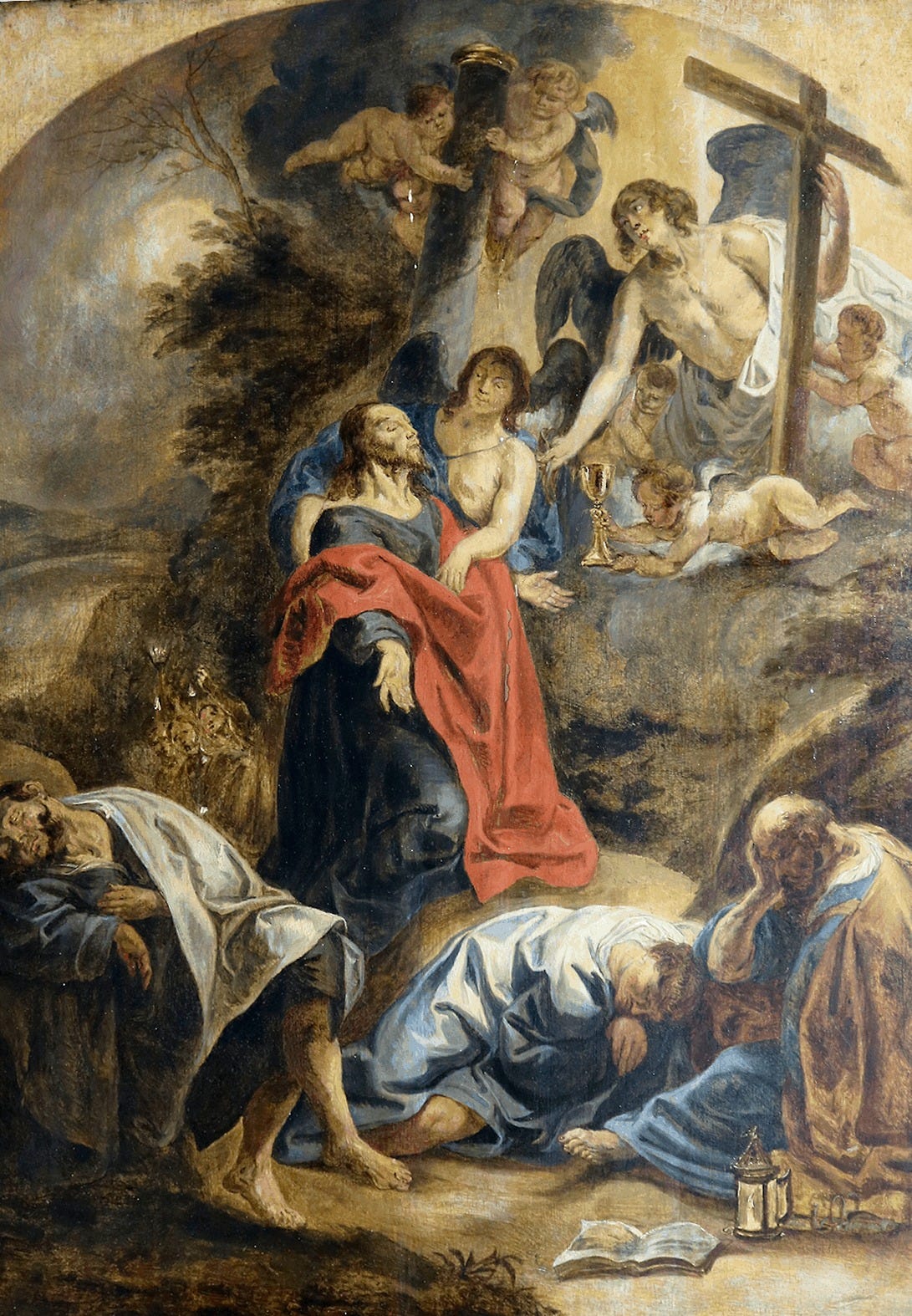Deep and Dreadful Slumber
A Friday 'flection
Each Friday (or Sunday, if I’m running behind) I post a short (re)flection on Scripture. Obviously this one is a bit late. I look at both Catholic and Protestant commentaries before writing my own, but the post itself is brief, to-the-point, and does not attempt to wade through all available views. I also try not to simply repeat what’s been said elsewhere. Since I mostly comment on the spiritual meaning of the text, my interpretation generally complements rather than competes with other readings, anyway. Welcome to Friday ’flections!
A brief housekeeping note: I need to briefly apologize for a pretty egregious typo in my last post. If you saw in your email that my article about the sign on the Cross literally got the wording wrong by writing “Christ” instead of “of Nazareth,” I can only say that you get what you pay for, and I don’t pay for an editor. It is now corrected on the online version!
Why couldn’t the disciples stay awake?
Twice in the Gospel narratives, first at the Transfiguration and then later during the Agony in the Garden, Jesus’ closest friends seem childishly unable to keep their eyes open. Peter, James, and John—three of history's greatest saints, pillars of the Church and archetypes of Christian devotion. They can’t even keep watch with their Lord for one hour? This unaccountable, seemingly irresistible drowsiness has the smell of the divine hanging about it.
At Gethsemane, Jesus first tells the disciples to “watch and pray, lest you enter into temptation.” Then, when He comes back and finds them sleeping, He wakes them up and admonishes Peter again to watch and pray. Here, as elsewhere, Peter represents the Apostles as their chief. Jesus then acknowledges that the disciples are held back by their physical limitations: “The spirit is willing, but the flesh is weak.” The warning against sin recalls God’s warning to a frustrated Cain: “Sin is crouching at your door; it desires to have you, but you must rule over it.”
The second time Jesus returns to find the disciples asleep, He lets them be and returns to his prayers.
The third and final time, He blesses their rest, and even commands them to complete it. He goes on, presumably after an interval, to announce that “the hour has come—the Son of Man is betrayed into the hands of sinners!”
There is Christ, sweating blood and conversing with angels; and again, there is Christ, shining like a living sun, taking counsel with Moses and Elijah. And here are the disciples, falling asleep. What kind of natural weariness could so totally disable a man, that even these events wouldn’t enliven him? Why didn’t the disciples simply stand up, or pace about to keep themselves awake? Surely that’s not too much to expect from those accustomed to “toiling all night” on the sea. The mystery exhausts merely human explanations; we turn to consider God’s intentions.
The author of Holy Writ is God, in whose power it is to signify His meaning, not by words only (as man also can do), but also by things themselves. So, whereas in every other science things are signified by words, this science has the property, that the things signified by the words have themselves also a signification.
Aquinas, Summa Theologiae, Ia, Q1A10
In Genesis, God puts Adam into a deep sleep before taking one of his ribs, which He will use to create Eve. Humanity has, in a way, been lowered back into the waters of chaos and raised again, a primordial baptism that makes the body into a means of gift and self-gift. Only at this point is man capable of actually carrying out the massive charge to “rule over the earth and subdue it.”
Later in Genesis, God causes Abraham (still Abram at this point) to fall into a deep sleep, and a “thick and dreadful darkness” descends upon him, not at all unlike the cloud that descends during the Transfiguration. This time God’s object is not to create humanity, but to consecrate a portion of it to prepare the way for the New Humanity. He sends a dream to Abraham, cutting a covenant with him that will define God’s people forevermore.
One sleep, and God makes man. A second sleep, and God initiates, without any action on Abraham’s part, a new covenant ordered to the Incarnation. A third sleep, passed by Christ in the tomb, makes all things new. It initiates the true and final “sabbath rest for the people of God.”
The drowsy disciples reenact this cosmic drama in miniature. Awoken from their first sleep, they are charged to stay awake and resist sin. They fail, and in their second sleep Christ leaves them be, departing to intercede on their behalf as He prepares to cut the New Covenant. When He returns and finds them asleep again, He no longer chastizes them but transforms human weakness into an occasion for grace.
Christ commands this sleep, his very last command before the hour of his Passion. Out of these men, Peter the Prince of the Apostles, James the leader of the mother church in Jerusalem, and John the Theologian, Christ builds the New Humanity, the Church. A small rib becomes a family more numerous than the stars. God puts them to sleep as sinners and failures—they wake, perhaps at first in ignorance, the glorious stewards of a “new and better covenant.”
This is one reason the episode in the garden doesn’t appear in John. While the synoptics rely on this episode to show the death of Christ as the great third sleep that recapitulates and fulfills what was promised to Adam and Abraham, John does it far more explicitly, as the Catechism explains.1 But we have seen that the more circumspect route is equally fruitful. The synoptics reveal the divine identity of Christ with impressive elegance. He is unveiled as the Creator of mankind, He who covenanted with Abraham and his descendants, and the One soon to pay for their infidelity. Just as surprising, perhaps, the Apostles are the true heirs of all God’s promises—it is their descendants promised in the diamond ink of numberless stars, they who would rule the earth and put it under the feet of Christ the God-man.
They could not stay awake because the hand of God lay heavy upon them, and they were weighed down with the cumulative failure of untold generations. Yet Christ, full of compassion for their weakness, turns all things to good for those who love Him. Truly the Scriptures say, “He grants sleep to those He loves.”
< Last Commentary | All Commentaries | Reformation Catholicism >
Paragraph 766: The Church is born primarily of Christ's total self-giving for our salvation, anticipated in the institution of the Eucharist and fulfilled on the cross. "The origin and growth of the Church are symbolized by the blood and water which flowed from the open side of the crucified Jesus." "For it was from the side of Christ as he slept the sleep of death upon the cross that there came forth the 'wondrous sacrament of the whole Church.'" As Eve was formed from the sleeping Adam's side, so the Church was born from the pierced heart of Christ hanging dead on the cross.





